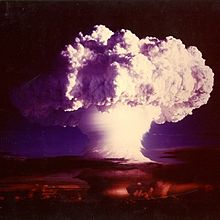
Back انقراض الإنسان Arabic মানব বিলুপ্তি Bengali/Bangla Ljudsko izumiranje BS Extinció de la humanitat Catalan Ende der Menschheit German Extinción humana Spanish Gizakiaren iraungipen Basque انقراض بشر Persian Extinction de l'humanité French הכחדת האנושות HE

Human extinction or omnicide is the hypothetical end of the human species, either by population decline due to extraneous natural causes, such as an asteroid impact or large-scale volcanism, or via anthropogenic destruction (self-extinction), for example by sub-replacement fertility.
Some of the many possible contributors to anthropogenic hazard are climate change, global nuclear annihilation, biological warfare, weapons of mass destruction, and ecological collapse. Other scenarios center on emerging technologies, such as advanced artificial intelligence, biotechnology, or self-replicating nanobots.
The scientific consensus is that there is a relatively low risk of near-term human extinction due to natural causes.[2][3] The likelihood of human extinction through humankind's own activities, however, is a current area of research and debate.
- ^ Di Mardi (October 15, 2020). "The grim fate that could be 'worse than extinction'". BBC News. Retrieved November 11, 2020.
When we think of existential risks, events like nuclear war or asteroid impacts often come to mind.
- ^ Snyder-Beattie, Andrew E.; Ord, Toby; Bonsall, Michael B. (July 30, 2019). "An upper bound for the background rate of human extinction". Scientific Reports. 9 (1): 11054. Bibcode:2019NatSR...911054S. doi:10.1038/s41598-019-47540-7. ISSN 2045-2322. PMC 6667434. PMID 31363134.
- ^ Bostrom 2013.